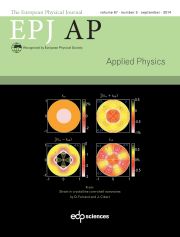Article contents
Experimental and numerical tools for miscible fluid displacements studies inporous media with large heterogeneities
Published online by Cambridge University Press: 15 June 1999
Abstract
We present a set of complementary experimental and numerical tools for studying miscible fluid displacements in porous media with large scale heterogeneities.Experiments are realized in transparent 2D Hele-Shaw cells allowing opticalobservations and in 3D packings of glass beads with an acoustical technique forimaging fluid displacements. Permeability heterogeneities are modeled by spatialvariations of either the local aperture of the Hele-Shaw cell or the diameter of thegrains used in the packing. The Hele-Shaw cell model provides high resolution maps ofthe invasion front location at regular time intervals and of the flow lines: thevelocity field is determined by combining these informations. Acoustical images ofrelative concentration distributions in the 3D packing are in agreement with Hele-Shawcell data and can be obtained in a broader range of experimental situations. Suchexperiments realized with a stabilizing density contrast between invading and displacedfluids demonstrate a strong reduction of the front width at low flow velocities, asimilar reduction is obtained at high velocities with a stabilizing viscositycontrast. The technique is also applicable to study fluid displacements in naturalopaque media. Numerical simulations by a Boltzmann lattice technique using aStokes-like diffusive term to smooth out the effect of permeability discontinuitiesprovide complementary informations. They are shown to give similar results asexperiments for same flow parameter values and to allow for a fast exploration of abroad range of fluid properties and flow situations.
- Type
- Research Article
- Information
- Copyright
- © EDP Sciences, 1999
References
- 4
- Cited by


